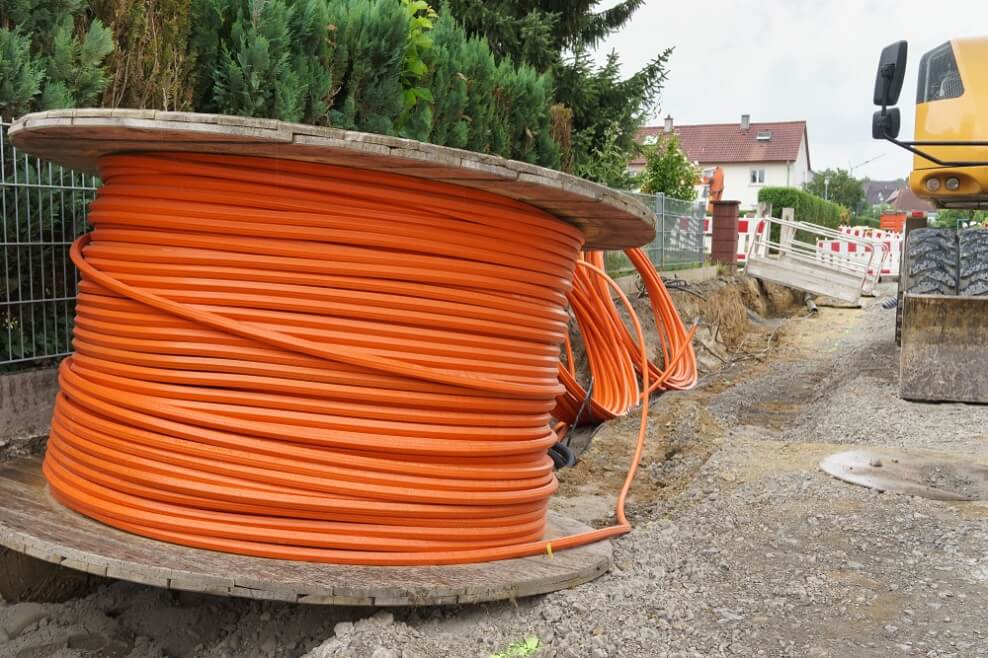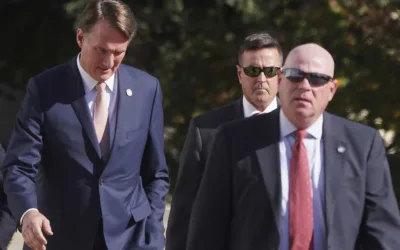
American Rescue Plan funding, along with state dollars, will help start the process to fix internet issues for several counties this year.
WASHINGTON, D.C. – More than 700,000 Virginians don’t have access to reliable internet. That’s especially true in rural Virginia, where the broadband problem affects one third of residents. It’s something state and federal lawmakers hope to fix, from Gov. Ralph Northam to Sen. Mark Warner. And part of how they make that happen is through the American Rescue Plan.
The American Rescue Plan, which Joe Biden signed into law last week, allocated funds for broadband expansion. If there’s one thing the pandemic made clear, it was that everyone needs high-speed internet in a world where telecommuting, telemedicine and distance learning are standard practice.
Specifically, there’s $17 billion set aside for broadband expansion.
“One of my top priorities on this bill was broadband,” Warner said. “I think if there’s one thing we’ve learned in the last year of COVID, is that high-speed internet connectivity, broadband, is an economic necessity, not a nice-to-have.”
Broadband Is A Top Priority For Henry
Now, to be clear, that’s $17 billion for the entire country, so it’s not an instant band-aid for Virginia’s issues. And lack of broadband is an issue. Overall, 11% of Virginia residents have no access to any type of internet service. That’s according to the 2019 Commonwealth Connect report, which detailed Gov. Ralph Northam’s push for universal broadband.
Some of those without reliable internet are students in Henry County, near the North Carolina border.
“The detriment to students who live in areas that do not have broadband or cell access has been abundantly evident through the pandemic,” said Monica Hatchett, director of communications for Henry County Public Schools. “While our division has been able to supply MiFis for students who have cell signal in their area – but no internet in their homes – there have been limitations in this solution as well.”
A MiFi is wireless router that acts as a mobile Wi-Fi hotspot. Also, Hatchett explained the Mifi devices only support a set amount of data and streaming in a day’s time.
“[HCPS has] worked closely with Xfinity to connect families with appropriate solutions, but in many cases, the costly expense of running cable from a main road to a student’s home is prohibitive for most of our families,” Hatchett said.
Even in-person classes have to deal with the problem. On March 22, internet went out across Henry County at 9am. It didn’t come back on until after 1pm. That limited what teachers could do either for the students staying remote or the kids currently in class, as not all work can be done with paper and pencil.
A County Seeks Connectivity
The same is true in Wise County, where approximately 40% of the system’s 5,500 students don’t have reliable internet. The district came up with their own solution, partnering with Elon Musk and Space X’s Starlink system to offer satellite internet service.
But that doesn’t help the rest of the county. For county residents who do not have students in the home – or who did not qualify for the trial – connectivity remains an issue.
“At one point, I was one of the people that did not have adequate internet and it was very frustrating. I do have it now. I moved to a different part of the county,” said Michael Hatfield. He works as Wise County’s administrator and economic development director. “It is something that is needed badly. Not just for our students who do need it very badly, but also our workers. That has limited their ability to work from home on some things, and just normal access that would be nice to have when you live in the 21st century.”
Hatfield said Wise County officials are working on the problem, but it’s hard to do that on your own, especially as a rural county with limited funding.
“What we are doing, we are attempting to put together the funding now to do a complete study for broadband and internet service for the county,” Hatfield said. “[It will focus] on how best to serve the underserved that we have now.”
While internet accessibility presented itself as a problem in Wise County years ago, the pandemic placed a spotlight on those issues.
“We’ve known we’ve needed it. It’s just that opening the eyes of the rest of the country on what it’s like to live in a rural county and not have adequate internet service,” Hatfield said.
State Plays a Part in Broadband Expansion
And if you’re wondering why the state hasn’t stepped in, they have. And this week they added more funding, but we’ll get to that in a minute. However, private companies run Virginia’s internet infrastructure. And they have to base decisions on if it’s financially feasible.
Is it worth spending $15 million to expand high-speed internet to a rural community of 30 to 40 homes? Or should they spend the same amount and expand in a city, with 300 to 400 new homes gaining access? Which decision is going to be the most cost effective?
That’s why parts of Virginia need state or federal funding to expand, or in some cases build, their network. But even that’s not a one-size-fits-all solution. It’s hard to lay the cable and build the network in a rocky or mountainous region. So in turn, places like Wise are turning toward satellite as an option.
Cue the American Rescue Plan. The $17 billion included in the package is the largest single federal investment in broadband in the nation’s history.
Approximately $7 billion will head toward more traditional programs like Lifeline and the E-rate Program.
The E-rate Program helps schools and libraries obtain affordable broadband. Lifeline, a program through the Federal Communications Commission, helps individual low-income families attain affordable communication services.
The remaining $10 billion will go toward state and local governments with “a great deal of flexibility,” Warner said.
Granting flexibility to individual areas of the state did away with a one-size-fits-all approach to internet services. Instead, it allowed each unique locality the opportunity to use funds in the best way.
“Oftentimes those decisions are best-made at the local level. As we’ve seen in Southwest Virginia, the best solution may be satellite connections. In Southside, there may be areas where wireless cell phone connection is, in a sense, a way for broadband. And in many parts, you know, making sure you’ve got fiber [cables] running straight to the house will be the option,” Warner said. “We want to give that flexibility, but we want to make sure that we expand the coverage [range].”
Not There Yet
State officials are also working to solve the broadband problem. On Thursday, Gov. Northam gave out $20.1 million in grant funding to 17 counties and cities. That money will fund 11 projects to improve broadband infrastructure.
What does that mean in real terms? It’ll connect more than 13,400 households, businesses and other companies to high-speed internet. In some places like Gloucester County, that means building one of the first wireless networks in the area.
In Montgomery County, $919,569 will help expand the area’s broadband network. That means connecting 44 businesses in Alleghany Springs, Elliston, Lafayette and Shawsville, as well as more than 1,200 homes.
Smyth, Washington and Wythe counties will also see things change, through a $7.8 million grant. The money will pay for the local broadband network’s expansion, extending it to 110 businesses and more than 5,200 homes.
The money was allocated during the Virginia General Assembly’s special session late last year.
Counties Still Need Help
While the state can do this one part at a time, there’s not enough local funding to address all the needs. That’s where the federal funding comes into play. And while even Virginia’s part of the $17 billion from the American Rescue Plan won’t cover all of the projects, it’s seen as a start.
“We still won’t get to the full 97% coverage across Virginia that I think we should be shooting for with that high-speed connectivity,” Warner said. “We’ll probably need to look at some additional funding in an infrastructure bill down the line.”
However, Warner noted the importance of the current funds.
“It is extremely important for the – literally – not just the 700,000 Virginians who don’t have any access to broadband, but those who have access to very slow service or unaffordable service,” Warner said. “Relief is on the way.”
When Wise County receives widespread, reliable internet accessibility, Hatfield expressed the positive impact it could have.
“It would open us up even more for people to be able to work from home, which would open us up to overflow from jobs from areas outside of the county that could telework. You know, it doesn’t matter if they live in the city or if they live out in the middle of nowhere. As long as they have internet access, they can do their job,” Hatfield said. “I think it would open us up a lot for employment opportunities for our people to do telework type projects.”
Amie Knowles reports for Dogwood. You can reach her at [email protected]
Support Our Cause
Thank you for taking the time to read our work. Before you go, we hope you'll consider supporting our values-driven journalism, which has always strived to make clear what's really at stake for Virginians and our future.
Since day one, our goal here at Dogwood has always been to empower people across the commonwealth with fact-based news and information. We believe that when people are armed with knowledge about what's happening in their local, state, and federal governments—including who is working on their behalf and who is actively trying to block efforts aimed at improving the daily lives of Virginia families—they will be inspired to become civically engaged.


Here’s everything you need to know about this month’s Mercury retrograde
Does everything in your life feel a little more chaotic than usual? Or do you feel like misunderstandings are cropping up more frequently than they...

VIDEO: Check out Dogwood’s new merch line
Big news, Virginia! We've officially launched our Dogwood merch line 🎉 This year, we celebrate 5 years of bringing you Virginia news you can use....

VIDEO: Your support matters!
Your support matters! Donate today. @vadogwoodnews Your support matters! Visit our link in bio to donate today. #virginianews #virginia #community...

Op-Ed: Virginia’s new Democratic majorities pass key bills to improve your lives, but will Youngkin sign them?
The 2024 Virginia General Assembly regular session has wrapped up. It was a peculiar session from the outset, with Democratic majorities in the...

From the state rock to the state flower, here’s how Virginia got its symbols
Have you ever wondered why the Dogwood is the state flower? Or how the cardinal became the state bird? We’re here to answer those questions and more...

VIDEO: Second-gentleman Douglas Emhoff gives speech on reproductive freedom
Second gentleman, Douglas Emhoff touched on reproductive freedom not only being a woman's issue but "an everyone's issue" during the Biden-Harris...





